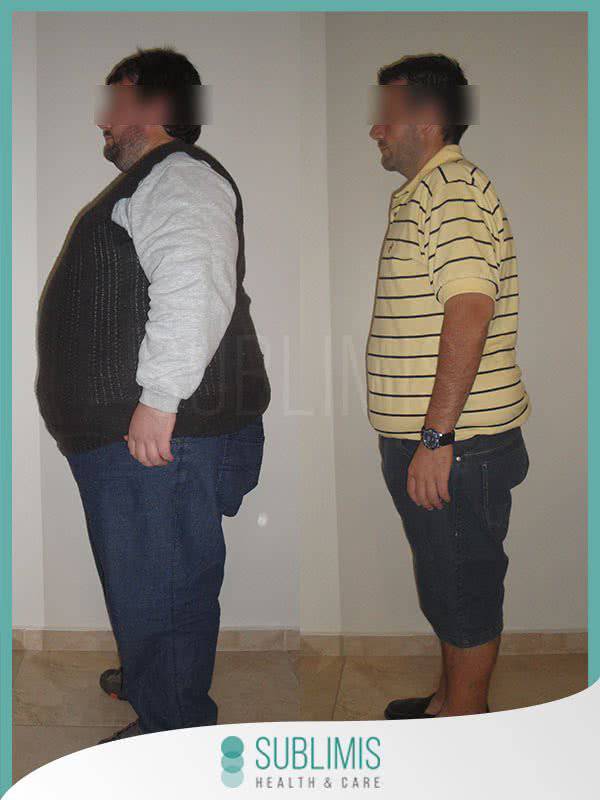Duration
1 Hour
Recovery
15 Days
Anesthesia
General
Results
Permanent
Hospital stay
24 - 36 Hours
Price
USD 5,900
Gastric Sleeve Surgery in Argentina
Bariatric Surgery is a specialty used to help patients neutralize obesity, allowing them to regain their quality of life and health. Advances in these types of surgeries allow patients to lose weight gradually, eating less and decreasing their appetite. The development of minimally invasive techniques allows the surgery to be performed through small incisions, with less pain and increased postoperative comfort.
In general, bariatric surgeries are based on reducing the size of the stomach in order to restrict the amount of food we can eat, or alter the digestive tract so that the body absorbs from it less calories than usual.
The gastric sleeve surgery has recently gained popularity and is associated with excellent results of weight loss. It is a restrictive procedure since approximately only 80% of the stomach is removed.
In order to achieve this, the stomach is divided by means of a vertical suture, turning the stomach's shape of a bag into a "sleeve" (hence its name). It is necessary to remove the remaining part of the stomach since it is completely isolated from the passing food. Since this technique does not restrict food to pass, the reconnecting of the intestines is not necessary to maintain the digestive process.
Since the stomach produces hormones associated with appetite, by taking out an important portion of the stomach, the patient's appetite is reduced, despite eating far less than before.
After the surgery
In the recovery room, you can expect to have some discomfort and feel the effects of the surgery (this can last for several days). Some medicine for this may be prescribed to help control pain. Or infusion pump may be used which provides a local anesthetic directly to the surgical site to control pain without the side effects of narcotics.
The changes made to your gastrointestinal tract will require permanent changes in your eating habits that must be followed for successful weight loss. What is vital is that you follow the physician guidelines'. The following are some of the usually accepted dietary guidelines:
- When you start the consumption of solid food, chew your food thoroughly and eat very slowly. It is important to wait a few minutes after swallowing before putting the next bite of food in your mouth.
- Don't drink fluids while eating. They will make you feel full before you have eaten enough food.
- Don't eat desserts and other items with sugar if they have more than 3 to 5 grams per serving size.
- Avoid carbonated drinks, high-calorie nutritional supplements, foods high in fat, milk shakes, and foods that have no nutritional value.
- Avoid alcohol.
- Reduce snacking between meals.
Returning to Normal Routine
After the gastric sleeve surgery, the surgeon requires you to get up and move around. You are asked to walk or stand at the bedside the night of surgery and take several walks the next day. After leaving the hospital, you may be able to concern on all your personal needs, but you will need help with shopping and lifting, and with transportation.
Drive is an activity that usually takes from 7 to 14 days to resume, as is not appropriate while under medications.
Depending on your physical condition, the nature of the activity, and the type of bariatric surgery you had, the surgeon suggests you the rhythm of returning to routine. Many patients return to normal levels of activity within six weeks of surgery.
It is strongly advised that women of childbearing age use the most effective forms of birth control during the first 16 to 24 months after bariatric surgery.
Reconstructive Plastic Surgery
If you have lost more than 100 pounds you also face another challenge excess of skin. You might notice this on the face, upper arms, chest and abdomen. Skin folds under the arms, breasts, abdomen and legs can cause rasping and bacterial and yeast infections.
Reconstructive surgery is indicated in this case. Reconstructive surgery can help give a more self-confident image. This results in better fitting clothing. Reconstructive surgery to improve your look should be delayed until your weight loss has stabilized for at least one year.
Norman Jalil, M.D.
Professional Medical License: 19398
Specialty License: 6273

- Specialist in General and Endocrine Surgery.
- Specialist in Minimally Invasive and Bariatric Surgery, University Hospital Claude Huriez, Lille, France.
- Full Member of the American Association of Endoscopic Surgeons (ALACE)
Before and After Photos
In the following photo gallery you will find images of before and after gastric sleeve surgery. Photographs of our former patients taken before performing weight loss surgery and after 6, 12 or 18 months of surgery. If you have any questions, do not hesitate to consult our doctors and receive your free quote.
Price
How much does a gastric sleeve surgery cost abroad? The reference price for a sleeve gastrectomy in Argentina is USD 5,900 but it may vary according to the needs and requirements of each patient. Please fill in the form below to contact us and get your Free Quotation!
Our prices includes: post surgery consultations and controls; surgeon, anesthesiologist, nurses, assistances fees; surgery and recovery room; supplies and disposable materials. Bilingual assistant, accommodation and transfers are optional. Prescribe medication after surgery, surgical belts (if required) are not included. No hidden fees!
Learn everything you need to know about Medical Tourism in Argentina.
SEND US YOUR CONSULTATION

Related Treatments
Duodenal Switch
Duodenal Switch Surgery is associated with the best results in terms of weight loss and is applied to severely obese patients. This method includes the two ways to help patients lose weight, since it combines a reduction of the stomach size with a rerouting of a lengthy portion of the small intestine.
Gastric Bypass
Bariatric Surgery is a specialty used to help patients neutralize obesity, allowing them to regain their quality of life and health. Advances in these types of surgeries allow patients to lose weight gradually, eating less and decreasing their appetite.
Lap Band
Bariatric surgery is a specialty that helps patients to neutralize obesity, thereby restoring the quality of life and health. Advances in the types of surgeries allow patients to gradually lose weight, eating less and no appetite.
Metabolic Surgery
Diabetes is a chronic disease that affects a large number of patients and that in their evolution leads to complications that negatively impact health status. Type 2 diabetes represents more than 90% of diabetes cases and, unlike insulin-dependent diabetes, is characterized by elevated insulin levels that are not effective.




















